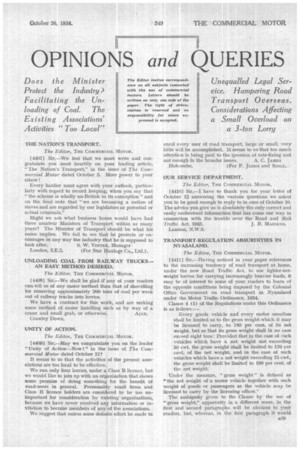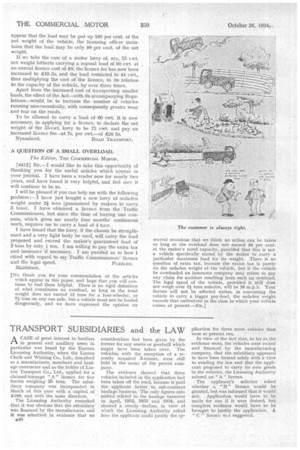OPINIO N S and QUERIES
Page 53

Page 54

If you've noticed an error in this article please click here to report it so we can fix it.
THE NATION'S TRANSPORT.
The Editor, THE COMMERCIAL MOTOR.
[4407] Sir,—We feel that we must write and congratulate you most heartily on your leading article, "The Nation's Transport," in the issue of The Commercial Motor .dated October 5. More power to your elbow!
Every haulier must agree with your outlook, particularly with regard to record keeping, when you say that " the scheme is wholly un-British in its conception" and on the final note that "we are becoming a nation of slaves and are regarded by our legislators as potential or actual criminals."
Might we ask what business house would have had three amateur Ministers of Transport within as many years? The Minister of Transport should be what his name implies. We fail to see that he protects or encourages in any way the industry that he is supposed to look after. S. W. VINTER, Manager London, S.E.5. (For Star Haulage Co, Ltd.).
UNLOADING COAL FROM RAILWAY TRUCKS— AN EASY METHOD DESIRED.
The Editor, THE COMMERCIAL MOTOR.
[44081 Sir,—We shall be glad if any of your readers can tell us of any easier method than that of shovelling for removing approximately 200 tons of coal per week out of railway trucks into lorries.
We have a contract for this work, and are seeking some method of easier handling such as by way of a crane and small grab, or otherwise. AJAX. Crawley Down.
UNITY OF ACTION.
The Editor, THE COMMERCIAL MOTOR.
[44091 Sir,—May we congratulate you on the leader "Unity of Action—Now I" in the issue of The Commercial Motor dated October 12?
It seems to us that the activities of the present associations are too local to be effective.
We run only four lorries, under a Class E licence, but we would like to join up with an organization that shows some promise of doing something for the benefit of road-users in general. Presumably small firms and Class B licence holders are considered to be too unimportant for consideration by existing organizations, because we have .never received any information or invitation to become meenbers of any of the associations.
We suggest that unless some definite effort be made to enrol every user of road transport, large or small, very little will be accomplished. It seems to us that too much attention is being paid to the question of rate-fixing and not enough to the broader issues. A. C. jAmEs Holcombe. (For F. James and Sons).
OUR SERVICE DEPARTMENT.
The Editor, THE COMMERCIAL MOTOR.
[44101 Sir,--I have to thank you for your letter of October 12 answering the various questions we asked you to be good enough to reply to in ours of October 10. The advice you give us is absolutely the only correct and easily understood information that has come our way in connection with the trouble over the Road and Rail Traffic Act, 1933. J. R. MAIDENS. London, NAVA& TRANSPORT-REGULATION ABSURDITIES IN NYASALAND.
The Editor, THE COMMERCIAL MOTOR.
144111 Sir.—Having noticed in your paper references to the increasing tendency of road transport at home, under the new Road Traffic Act, to use lighter-netweight lorries for carrying increasingly heavier loads, it may be of interest to some of your readers to learn of the opposite conditions being imposed by the Colonial Office Government on road transport in Nyasaland under the Motor Traffic Ordinance, 1934.
Clause 4 (1) of the Regulations under this Ordinance is as follows
Every goods vehicle and every motor omnibus shall be limited as to the gross weight which it may be licensed to carry, to 180 per cent. of its net weight, but so that its gross weight shall in no case exceed eight tons: Provided that in the case of such vehicles which have a net weight not exceeding 30 cwt. the gross weight shall be limited to 170 per cent, of the net weight, and in the ease of such vehicles which have a net weight exceeding 75 cwt., the gross weight •shall be limited to 190 per cent, of the net weight.
Under the measure, " gross weight" is defined as " the net weight of a motor vehicle together with such weight of goods or passengers as the vehicle may be licensed to carry by the licensing officer."
The ambiguity given to the Clause by the use of "gross weight," apparently in a different sense, ii. the first thin Send paragraphs will he obvious to your readers, but, whereas, in the first paragraph it week'
appear that the load may be put up 180 per cent, of the net weight of the vehicle, the licensing officer maintains that the load may be only 80 per cent, of the net weight.
If we take the case of a motor lorry of, say, 55 cwt. net weight hitherto carrying a no.rmal load of 60 cwt. at an annual licence cost of 18, the licence fee has now been increased to 119 5s. and the load restricted to 44 cwt., thus multiplying the cost of the licence, in its relation to the capacity of the vehicle, by over three times.
Apart from the increased cost of transporting smaller loads, the effect of the Act—with its accompanying Regulations—would be to increase the number of vehicles running uneconomically, with consequently greater wear and tear on the roads.
To be allowed to carry a load of 60 cwt. it is now necessary, in applying for a licence, to declare the net weight of the 55-cwt. lorry to be 75 cwt. and pay an increased licence fee—at 7s. per cwt.—of 126 5s.
Nyasaland. Ron TRANSPORT. A QUESTION OF A SMALL OVERLOAD.
• The Editor, THE COMMERCIAL 3/14TOR.
[4412] Sir,—I would like to take this opportunity of thanking you for the useful articles which appear in your journal. I have been a reader now for nearly two years, and have found it very helpful, and feel sure it will continue to be so. ,
I will be pleased if you can help me with the following problem :—I have just bought a new lorry of unladen weight under 2+ tons (guaranteed by makers to carry 3 tons). I have obtained a licence from the Traffic Commissioners, but since the time of buying one concern, which gives me nearly four months' continuous work, requires me to carry a load of 4 tons.
I have found that the lorry, if the chassis be strengthened and a very light body be used, will carry the load proposed and exceed the maker's guaranteed load of 3 tons by only ton. I am willing to pay the extra tax i and insurance f necessary. I am puzzled as to how I stand with regard to my Traffic Commissioners' licence and tlie legal speed. PUZZLED. Maidstone.
[We thank you for your commendation of the articles
which appear in this paper, and hope that you will continue to find them helpful. There is no rigid definition of what constitutes an overload, so long as the total weight does not exceed 12 tons for a four-wheeler, or 7i tons on any one axle, but a vehicle must not be loaded dangerously, and we have expressed the opinion on several occasions that we think no action can be taken so long as the overload does not exceed 50 per cent. of the maker's rated capacity, provided that this is not a vehicle specifically stated by the maker to carry a particular maximum load for its weight. There is no question of extra tax, because the excise tax is purely on the unladen weight of the vehicle, but if the vehicle be overloaded an insurance company may refuse to pay any claim for accident resulting from such an overload. The legal speed of the vehicle, provided it still does not weigh over 2+ tons unladen, will be 20 m.p.h. Your licence will not be affected unless, in converting the vehicle to carry a bigger pay-load, the unladen weight exceeds that authorized in the class in which your vehicle comes at present—En.]




























































































